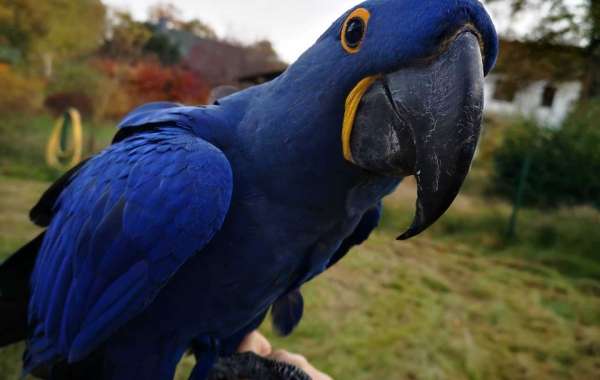These birds are easy to train and are rarely aggressive. They do best when handled regularly and can imitate words.
Macaws are fed pellets, fresh fruits and vegetables, and seed. They also need a few perches of wood for climbing and chewing.
Macaws can develop a dominant streak, particularly when they first move into the new environment. To avoid this, an avian behaviorist and a veterinarian should be consulted.
Training
Macaws are highly intelligent birds that thrive with regular handling, enrichment, care, and space to exercise. They enjoy playing, exploring their surroundings and manipulating objects. They also enjoy being "skritched" or cuddled when they feel at ease with the person.
Macaws who are not treated properly may become territorial, aggressive or destructive. If they are bored, they may also turn to feather picking as a form of self-mutilation. To avoid boredom, provide various textured toys and multiple perches. Playing with toys that simulate preening will also help prevent boredom induced feather destruction. If you observe these behaviors, consult a qualified avian behaviorist and/or veterinarian.
Young macaws that are raised by hand are well-adjusted to new environments and training. Introduce them to new people, car trips and hospital visits as well as other pets (including cats and dogs) and other birds at an early age. They are easily imprinted and require regular handling from a young age to prevent them from developing one person bonds. These birds can be loud and aggressive when this happens. Discipline, leadership, patience, hooding (covering the head), and sense of ritual are crucial in reversing these behaviors.
Larger macaws such as the Blue and Gold, Scarlet, Military and Hyacinth are more prone to behavioral problems as adults. Hormonal imbalances can trigger anxiety and depression. If left untreated the issues could turn into serious health issues for the parrot, and an unsettling situation for the owner.
Mini macaws are more docile than larger macaws. They generally, they can learn words, tricks, and basic obedience commands. They do not bond as readily with their owners, and will not often snuggle or cuddle with them. To establish a bond you should spend time each day with your bird outside of their cage. talk to them in a reassuring tone to get them used to your voice. Once you've established a relationship and you are able to teach your bird to hop onto your finger to learn to communicate in a safe environment.
You can also read about how to take care of yourself.
Macaws require interaction with their humans. They are intelligent and social birds. If they are not given enough playtime daily with their humans they could become bored and depressed. If they are not properly handled, a depressed macaw may self-mutilate by pulling out its feathers, which can be extremely dangerous.
Socialization and training early are vital to prevent these problems. Macaws need to be treated regularly to strengthen the bond between them and their owners, improve their general health, and allow for an easy inspection of the body for any injuries or abnormalities. Macaws can also be destructive, so owners should ensure that their pets have plenty of toys that are heavy duty to keep them from furniture made of wood and other items that are tempting in the home.
The nails of a macaw should be cut on a regular regularly. This helps with the handling of the bird, and makes it less likely for the nails to get caught in things like caging and toys. The shorter nails also helps to keep them clean and healthy.
Macaws require a huge cage that allows them to fly and exercise. A minimum cage size of 3 feet wide, 2.5 feet deep and 6 feet tall is recommended. These large birds should be capable of spreading their wings when in flight and also have room for climbing, perching and toys.
It is a great way to enrich the life of your macaw by providing him with toys that he can play with foraging, such as chewable wooden toys, rope toys, puzzles that he can disassemble, as well as mechanical toys. Offering an array of branches for your macaw to climb on and hide on is another way to provide physical enrichment.
If your macaw is acting oddly, is gasping for breath, or is unfocused and agitated It could be trying to lay an egg. The eggs can place pressure on the nerves that control the legs, and can cause self-mutilation and paralysis, so if you see this behavior, you should contact your veterinarian or the local animal emergency clinic.
Feeding
Macaws are omnivores. As such, they are omnivores, and will eat fruits and vegetables as a part of their diet. They also can eat pellets, nuts, and commercial parrot foods.
They will need to be provided with diverse food choices every day to ensure that their diet is balanced. They consume less than their large counterparts, so owners will not need to make quite as many trips to the pet store. This can save you some money and that's always positive thing!
Hahn's Macaws are good chatters. They make the loud, short-lived calls to locate their flock members. They will also make loud and piercing contact calls if they are anxious or scared.
It is recommended to start your macaw off by touching the entire body, particularly in the wings and behind the head. They love being touched and love being pampered! To keep your bird healthy, you must perform annual examinations. This is the time to check for parasites, fecal tests and other issues with avian health.
If you're thinking of getting a macaw you will need an enclosure that measures at least 36" by 24" by 24". This will allow your macaw to stretch and fly around. They should be able to work out their natural energy to remain healthy and happy.
The cage should have several perches and be well-ventilated to provide the bird with options. Offering the macaw a variety of ways to let off their energy will prevent them from becoming bored and stressed out. They are extremely active in the wild and need to be able release their energy when they are at home.
Adolescent hormones are a big problem for these little birds. As they grow older, they can act like teenagers, and can become annoyed. This can be challenging for new owners of parrots as they learn how to live with their bird. The best way to approach this is to be patient and encourage their positive behavior.
Health
Macaws love to play with their owners and develop strong bonds. They are smart and can are able to communicate well. They can be a wonderful companion for 45 to 50 years. They can be very nippy and difficult to handle if they are not socialized from a young age. The species will be content and make a great pet if you train it and give it lots of love and attention.
Hahn's mini macaws have all the excitement and enjoyment of large macaws but in a smaller. They are affectionate and love cuddling, but do not exhibit the same tendency to bite or nip as often as larger macaws. They are acrobats who are active but can also be calm and peaceful. They are an excellent option for those who would like Macaws but don't have the space to house a larger bird.
The chestnut-fronted Macaw, also known as a severe macaw is among the most affluent breeds of mini macaws. It is green with patches of blue and red on the wings. The head is an ebony brown patch that has lines of black feathers above the eyes. The chestnut-fronted macaw is aggressive during puberty and this can cause issue in the cage. This bird is a great learner and responds well to handling.
Generally, macaws are not territorial but they can become aggressive if their environment is too crowded and stressful. If this happens, it's advised to put the bird in an quiet area until they settle down. A vet can perform an entire physical examination on your bird to check their eyes, ears and heart. A stool sample can also be taken to test for parasites.
 Your macaw will need to be wormed on a regular basis, so be sure to have a wormer such as Worm-Away from Birdsville. Also, you will need to change the water on a regular basis and ensure that the cage has plenty of fresh clean air. Keep the cage out of direct sunlight since it could cause the bird to become sick.
Your macaw will need to be wormed on a regular basis, so be sure to have a wormer such as Worm-Away from Birdsville. Also, you will need to change the water on a regular basis and ensure that the cage has plenty of fresh clean air. Keep the cage out of direct sunlight since it could cause the bird to become sick. 







